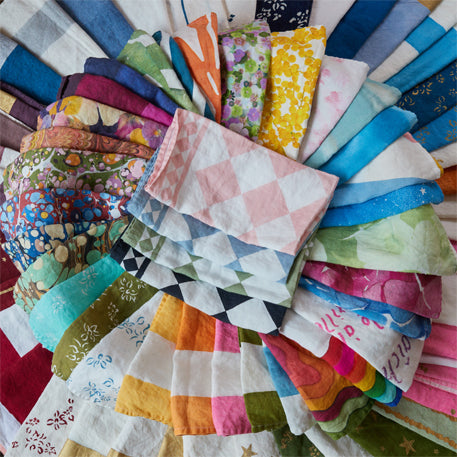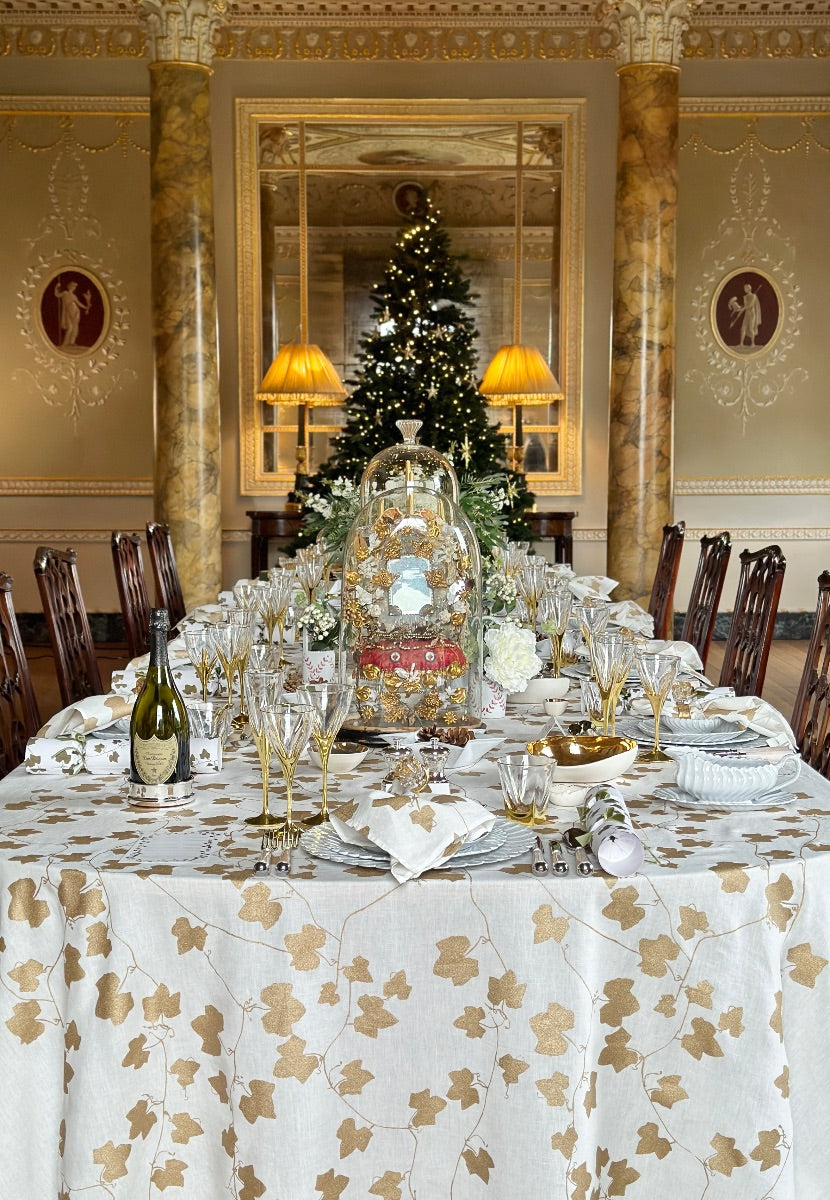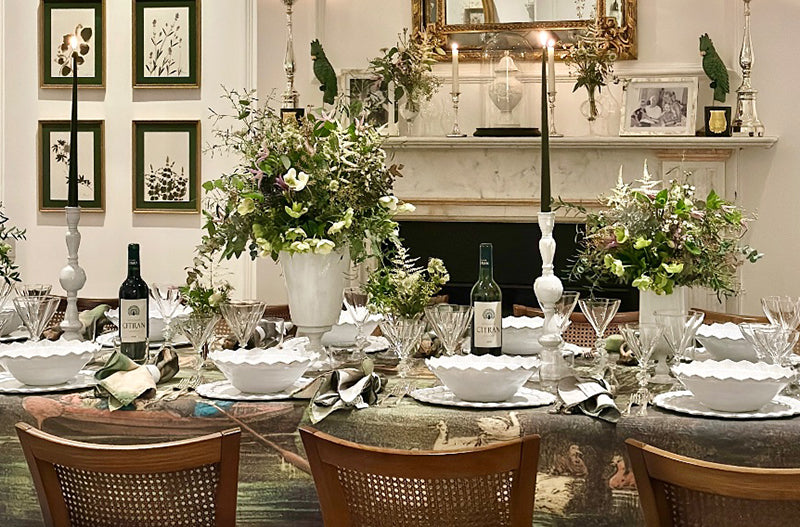Meanderings
Celebrate with Les Airelles
/ 30 November, 2025Merriment & Mistletoe
/ 29 November, 2025A Picture Perfect Thanksgiving
/ 25 November, 2025
Food for Thought

21 years ago when the founders of Summerill and Bishop opened their shop, they sent out their first press release. In the interviews they gave, they talked about why they were opening a kitchen shop; how they felt the kitchen was the true heart of the home and the importance of regularly getting the family around the table for a meal.
The ritual of preparing a meal and the actual sitting down for it is something that is at the core of what Summerill and Bishop's founders stood for all those years ago.
Today, it is still a belief we stand behind.
Several weeks ago we were lucky enough to listen to a seminar by the brilliant Julie Johnson on bringing up confident children. During that seminar, she spoke about the importance of the 'family meal'. We came away so inspired by what she had to say that we thought we should share her insights with you.

S&B
WE ARE ALL SO BUSY THAT FINDING THE TIME TO SIT DOWN FOR A FAMILY MEAL SEEMS TO BE MORE AND MORE CHALLENGING. WHY IS IT SO IMPORTANT?
JJ
Interestingly, your question itself raises one of the important reasons for having family meals together. You talk about us all being so busy and finding time being a challenge, actually sitting down and taking time over a meal is important for all of us, not just families and children.
In our time poor world, we often forget the value of sharing a meal together.
A shared meal is an experience, which utilises so many of our senses; sights, touch, smell, taste, listening. It’s also about a shared experience and connecting as a family.
It is about both giving and receiving of attention, which is a core human need. It is about a connection and community, again, both core human needs.
Recent research has shown that for all children, but particularly teenagers, a regular family meal reduces the negative impact of peer pressure, even if the teenager does not speak, so that takes a lot of pressure off us!

S&B
'FINE' IS ABOUT ALL WE GET FROM OUR KIDS AT THE DINNER TABLE, ANY TIPS ON HOW WE CAN SQUEEZE A LITTLE MORE OUT OF THEM?!
JJ
Now that's a good question, how long have you got! Some children are naturally very chatty and may find it difficult to understand that others might want to talk, whilst others are quieter and more private. Both these are normal and just how some children and adults are, though in our world today we tend to value extroverts, chatty people/children more. It's important to let your children be who they are, allowing the quieter, more reflective ones space to talk and encouraging the chatter boxes to give room for others to communicate.
One fun way is to have a 'talking' object and whoever has the object in front of them means it's their turn to talk. Younger children in particular may respond well to this, though it is also important to remember the rule also applies to the adults.
Another helpful tip, is possibly avoiding at all cost, the question which most children dread, "how was your day and what did you do in school today/this week...?’" On behalf of all children on planet earth, that question should be banned. Now, if you have a child who happily chats away having been asked that question, feel free to continue asking it. But if you have a child who answers fine/stuff, you are wasting your breath.
Children say to me that they hate the questions as they feel put on the spot, especially if it is after a long day at school. They have been answering questions all day and this is yet another question!
I appreciate parents are trying to connect with their children and show an interest in their lives by asking these questions, but if the answers are as above and the parent feels the child does not appreciate the effort they are making, it is a wasted and unhelpful question.
Here are a couple of alternatives you could try:
Play 'Sad, Mad, Glad'. At meal times, ask everyone around the table to share with the rest of the family something that made them feel mad, sad and glad today or this week. Everybody shares; both the children and the parents.
Play 'Sad, Mad, Glad'. At meal times, ask everyone around the table to share with the rest of the family something that made them feel mad, sad and glad today or this week. Everybody shares; both the children and the parents.
Another option is to simply only talk about your day, until your child loses the will to live and starts to talk about their own day! A mother of a teenage girl tried this and to her great surprise it worked a treat and her daughter started chatting away.
A different route is to think about events going on in our world that are age appropriate and start chatting about the news. I know that a lot of news is negative and parents may feel inappropriate for the dinner table etc. but there is a newspaper called ‘Positive News’, which may be helpful to subscribe to and can have lots of positive and interesting articles for the family to talk about.

S&B
WHAT'S THE RIGHT NUMBER OF FAMILY MEALS A WEEK? WHAT SHOULD WE BE AIMING FOR?
JJ
Research has shown that when families can eat a daily meal together, it strengthens family ties and cultivates a sense of connection and security in the children, right across the age ranges (teens included). So in an ideal world, this would be at least one meal a day. These meals may vary during the week, perhaps breakfast or dinner during the week and a variety of different meals on the weekend.
Some families, with time permitting, will get up early to enable the family to breakfast together, especially if both parent’s work or work late, as this creates a connection at the beginning of the day. Children as they age can take responsibility in laying the table for a family meal, by setting it the night before. I remember my father every night setting the breakfast table and how we would all as a family sit down and have breakfast together and then everyone would head off to school or work.

S&B
WHENEVER WE ARE FORTUNATE ENOUGH TO GO OUT FOR A MEAL, WE SEEM TO SEE MORE AND MORE CHILDREN SITTING AT THE TABLE WITH ELECTRONIC GADGETS. WHERE DO YOU STAND WITH TECHNOLOGY AT THE DINNER TABLE?
JJ
Technology at the table causes a lot of conflict today, so think ahead and have clear rules about it, which need to be role modelled by the parents. Having a meal together is about the experience and being fully present with yourself and each other, not elsewhere distracted by technology. If a parent really does need to take a call or is expecting one, tell the family and explain why, then leave the table when the person calls. Or even better arrange for the call to be before or after the meal, asking yourself do you REALLY need to take this call right now!

S&B
WE'VE HEARD FUNNY ANECDOTES OF CHILDREN'S STORIES DOMINATING THE DINNER TABLE FOR AN ENTIRE MEAL. CHILD CONFIDENCE IS A HOT TOPIC, HOW CAN YOU ENCOURAGE THE SKILL OF INTERESTING CONVERSATION WITHOUT DAMAGING THEIR CONFIDENCE?
JJ
I find myself challenged by that question, part of me wants to reply that if the child is not interesting whose problem is that, the adult or the child? Another part of me recognises that it is good for children to learn how to communicate, share about their day and tell an interesting story that doesn't take the whole of meal time. Maybe it is a balance of both, depending on the age of the child, what it is they are talking about and how important it is to them.
We may need to say ‘‘wow that was interesting’’ or ‘‘thank you for telling me about that but remember the family rule of everyone getting a chance to talk at mealtime, so shall we check in with everyone else and see what others have to share?’’
So keep any boundaries positive and not critical or personalised - ‘‘Well I think that's enough of that, you’ve spoken for long enough’’ or ‘‘don't hog the conversation!’’ are not positive, nor helpful responses.
A good thing to think about in all aspects of parenting including meal times is having family rules, which you as parent think about, decide on and then make sure the children know about. And as children get older you re visit, adapt and change at times including them in this process.

S&B
SOMETIMES A DINNER CAN END UP WITH ONE MEMBER OF THE FAMILY STORMING OFF. IS CONFLICT HEALTHY AT THE DINNER TABLE?
JJ
Conflict is the stuff of life and can’t always be avoided but can be reduced, responded to and learnt from. It often depends on how we, as adults, feel about conflict and how well we handle it. I often hear from working parents that they would like the time with their children to be positive and are keen to avoid any conflict especially at the weekends. That is both unrealistic and unhealthy. We can learn so much through conflict about ourselves and each other (that's us the parents!). Children develop their relationship skills by experiencing conflict at home and that will include during meals.
Some things to think about are:
How you as a parent feel about conflict; some of us actually like conflict, and want to win an argument, rather than compromising and letting both parties win. We can often react and get angry really quickly rather than quietly speaking to the child about what is wrong or what you expect of them. We often also expect children to behave like mini adults and can sometimes also be overindulgent towards them. Both are unhealthy approaches.
Many of us get caught up in table manners and although as parents we do need to teach our children manners, sometimes we get so tied up about it we forget what is actually important; which is being together.
Most children will develop good table manners; this can often materialise over a period of time and comes from just learning what is appropriate and what is not.

S&B
WE OFTEN HEAR STORIES OF FAMILY KITCHENS TURNING INTO RESTAURANTS IN ORDER TO CATER TO EVERYONE'S TASTE. ANY RECOMMENDATIONS ON HOW WE CAN KEEP EVERYONE HAPPY SO THAT WE DON'T HAVE TO PREPARE MULTIPLE DISHES?
JJ
Can we or even should we keep everyone happy? Although I don't agree with parents saying that everything on a child’s plate needs to be finished, children need to eat a certain amount so that we don't give them snacks between meals, which are going to fill them up.
I do feel it is dangerous to start cooking different things for different children. We waste so much food in the West and children don't learn to appreciate the value and importance of food if they can make demands all the time in regards to what they want to eat. Children’s taste buds are developing as they grow and what they may not like at five, they may love at ten. My son hated mushrooms as a child, but the deal was if we were eating them, he too would have to have some on his plate. He would have to eat some and could then maybe give away the rest. But he had to keep trying them and then suddenly, he fell in love with them.
As a parent planning ahead the week’s meals, taking note of favourite dishes, likes and dislikes will help. A child may get a favourite dish once a week, but the deal is we eat what we are given. This includes adults as well, as often we have one rule for children so then as parents, we are not being good role models.

S&B
WE ALL WANT OUR KIDS TO BE INVOLVED IN PREPARING THE MEAL, SET THE TABLE AND CLEAR IT UP, HOWEVER SOMETIMES IT'S EASIER TO JUST DO IT OURSELVES. ANY TIPS OR THOUGHTS ON THE IMPORTANCE OF HAVING THE CHILDREN HELP?
JJ
It’s so good to get children of any age involved on the preparation and clearing up of family meals, but as you say, for some parents it seems easier to just get on and do it ourselves.
I’d suggest on a regular basis that the children get to choose what the family are going to eat. This could be a special family night once a month where someone chooses the food, someone else the DVD you are going to watch or game you are going to play together after the meal.
The child who’s turn is it to choose the meal could be involved in the shopping (if possible). Age appropriate, they help cook the meal with a parent and serve it, setting the table etc. Then the rest of the family have to clear up and everyone joins in with the game, DVD etc.
This can be rotated around the family and as the children get older, they can take on more responsibility for the meal.
On a daily basis though it is vital for children, age appropriate, to lay the table, clear their plates, stack the dish washer and empty it. These jobs are so important for children on number of levels. They need to learn skills and competencies as one day they will leave home and need to be able to do things for themselves. This approach tells them that you trust them by giving them responsibility.
Children are part of the family unit and need to take responsibility in supporting that unit as they grow and develop.
The number of young people who arrive at university with no basic skills in cooking, shopping or running a home is ever worrying.

S&B
WHAT IS YOUR FAVOURITE MEAL?
JJ
Mmmmm I just like food, all kinds of food and what I enjoy most is having a meal with my children or good friends. Savoring the experience of the food (especially if we are tasting each others dishes), good wine (full bodied red!), good company and the combination of laughter and serious conversations.
About: Julie Johnson
(RN; SN Cert; HE Cert; Dip Ed Studies; Substance Use & Misuse Cert; Adolescent & Child Counseling; Systemic Counsellor, Human Givens Psychotherapist, Mindfulness Practitioner & Educator)
Julie is a child & adolescent systemic psychotherapist & parent coach. She is a leading provider of parenting, children & young people’s workshops and seminars in London. She is author of a number of children’s books on issues such as bullying, anger and step families & has contributed to a number of Radio 4 productions e.g. ‘Bringing up Britain’, and a series on Cyber Bullying etc.
Julie worked as a school therapist for 20 years at secondary school and currently works with several leading Independent schools in and around London e.g. Thomas’s London Day Schools, Kings College Wimbledon, Queens Gate, Bradfield, St Pauls and Colet Court. She also speaks regularly with the business sector clients include Credit Suisse, Citi Group and Deutsche Bank.
Julie's recommended reads:
Raising an Emotionall Intelligent Child. The Heart of Parenting - John Gottman Ph.D.
Julie's recommended Ted Talk:
Ted Talks - Susan Cain: The Power of Introverts
Julie's recommended Ted Talk:
Ted Talks - Susan Cain: The Power of Introverts














